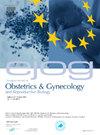多核苷酸乳膏在乳腺癌辅助治疗中的生物刺激作用。
IF 1.9
4区 医学
Q2 OBSTETRICS & GYNECOLOGY
European journal of obstetrics, gynecology, and reproductive biology
Pub Date : 2025-10-03
DOI:10.1016/j.ejogrb.2025.114754
引用次数: 0
摘要
目的:评价一种多核苷酸阴道乳膏治疗乳腺癌辅助治疗患者绝经期泌尿生殖系统综合征(GSM)的疗效和安全性。方法:在那不勒斯费德里科二世大学进行前瞻性单臂纵向研究。60名患有乳腺癌和GSM的妇女根据标准化方案接受了基于多核苷酸的阴道乳膏6个月的治疗。在基线、1个月和6个月时评估临床和患者报告的结果。终点包括阴道健康指数(VHI)、外阴评估评分(VuAS)、阴道评估评分(VAS)、女性性功能指数-6 (FSFI-6)、国际尿失禁咨询问卷-尿失禁简表(ICIQ-UI SF)和全球患者满意度。结果:入选的60名女性(平均年龄50.6±7.0岁)中,53名完成了研究。在6个月时,平均VHI从11.9±2.3增加到17.6±2.4,而VAS和VAS分别从6.3±2.0下降到2.3±1.1和从4.7±2.0下降到1.4±1.5(均p)结论:对于接受辅助治疗的乳腺癌幸存者,基于多核苷酸的阴道乳膏是一种耐受性良好的非激素选择,可有效控制GSM。本文章由计算机程序翻译,如有差异,请以英文原文为准。
Biostimulation with polynucleotide cream during adjuvant therapy for breast cancer
Objective
To evaluate the efficacy and safety of a polynucleotide-based vaginal cream for the treatment of genitourinary syndrome of menopause (GSM) in breast cancer patients receiving adjuvant therapy.
Methods
A prospective, single-arm longitudinal study was conducted at the University of Naples Federico II. Sixty women with breast cancer and GSM were treated with a polynucleotide-based vaginal cream for 6 months according to a standardized regimen. Clinical and patient-reported outcomes were assessed at baseline, 1 month, and 6 months. Endpoints included the Vaginal Health Index (VHI), Vulvar Assessment Score (VuAS), Vaginal Assessment Score (VAS), Female Sexual Function Index–6 (FSFI-6), International Consultation on Incontinence Questionnaire–Urinary Incontinence Short Form (ICIQ-UI SF), and global patient satisfaction.
Results
Of the 60 women enrolled (mean age 50.6 ± 7.0 years), 53 completed the study. At 6 months, the mean VHI increased from 11.9 ± 2.3 to 17.6 ± 2.4, while the VAS and VuAS decreased from 6.3 ± 2.0 to 2.3 ± 1.1 and from 4.7 ± 2.0 to 1.4 ± 1.5, respectively (all p < 0.001). Dyspareunia, vaginal dryness, and vulvar itching were significantly improved. Mild improvements were also observed in sexual function and urinary symptoms. The treatment was well tolerated, with no serious adverse events reported.
Conclusion
For breast cancer survivors receiving adjuvant therapy, polynucleotide-based vaginal cream is a well-tolerated, non-hormonal option that effectively manages GSM.
求助全文
通过发布文献求助,成功后即可免费获取论文全文。
去求助
来源期刊
CiteScore
4.60
自引率
3.80%
发文量
898
审稿时长
8.3 weeks
期刊介绍:
The European Journal of Obstetrics & Gynecology and Reproductive Biology is the leading general clinical journal covering the continent. It publishes peer reviewed original research articles, as well as a wide range of news, book reviews, biographical, historical and educational articles and a lively correspondence section. Fields covered include obstetrics, prenatal diagnosis, maternal-fetal medicine, perinatology, general gynecology, gynecologic oncology, uro-gynecology, reproductive medicine, infertility, reproductive endocrinology, sexual medicine and reproductive ethics. The European Journal of Obstetrics & Gynecology and Reproductive Biology provides a forum for scientific and clinical professional communication in obstetrics and gynecology throughout Europe and the world.

 求助内容:
求助内容: 应助结果提醒方式:
应助结果提醒方式:


